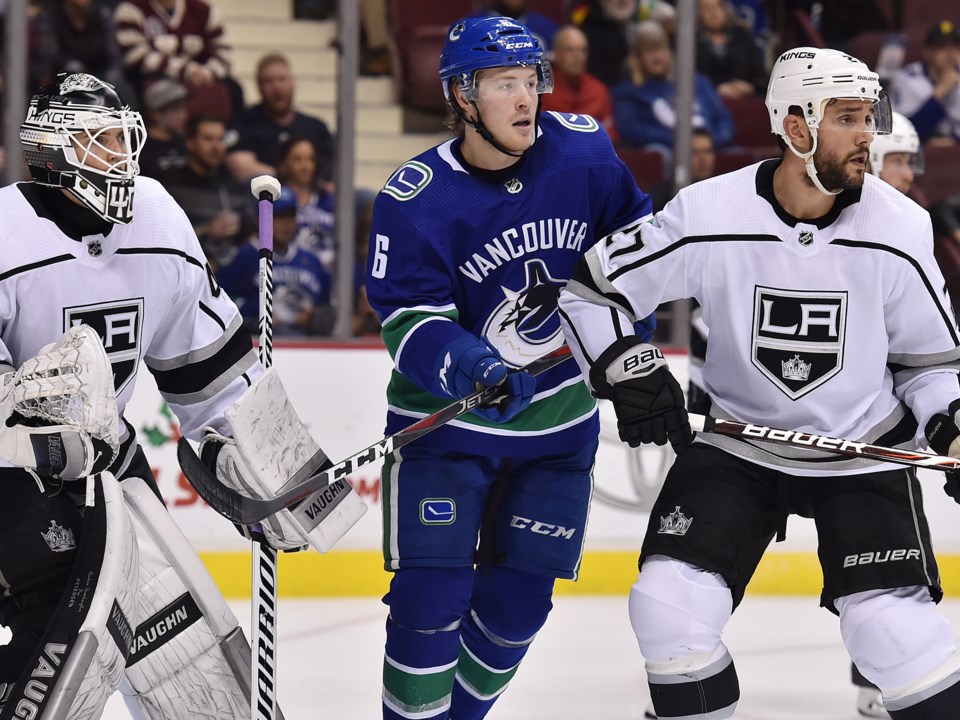The Paper Feature is a weekly column and sidebars that appears in the print edition of the Vancouver Courier newspaper. Track it down!
An unusually large number of restricted free agents haven’t been signed this off-season, including some of the best players in the NHL. Mitch Marner was 11th in league scoring last season with 94 points. Brayden Point was right behind him with 92 points and was sixth in goalscoring with 41 goals.
Other top RFA forwards that have yet to be signed include Mikko Rantanen, Matthew Tkachuk, Patrik Laine, Kyle Connor, Travis Konecny, and Colin White. Then there’s the defencemen, like Zach Werenski, who had 44 points last season, Ivan Provorov, who was sixth in the NHL in ice time per game, and Charlie McAvoy, the new number one defenceman for the Boston Bruins.
This group of RFAs have limited leverage, as they haven’t played in the NHL long enough to be eligible for salary arbitration, a process that brings in an independent arbitrator to decide on a fair contract. Teams generally try to take advantage of that lack of leverage to sign players to team-friendly contracts that extract the most value possible.
There’s one other player that belongs in the above list: the Vancouver Canucks’ Brock Boeser.
Boeser has quickly established himself as a crucial part of the Canucks core, forming a formidable one-two punch on the top line with Elias Pettersson. While his health has hindered his ability to rack up goals in his first two seasons, he looks like he’ll be a perennial 30-goal scorer capable of flirting with 40 goals throughout his career.
That makes Boeser’s contract a crucial one for the Canucks. It could set the baseline for other parts of the Canucks core that will come up for contract renewal in the near future, like Elias Pettersson and Quinn Hughes. A long-term contract could secure Boeser’s services at a cheap cap hit for years to come, while a short-term contract could save them money for a few years, but potentially cost them more when he needs a new deal.
Making matters more complicated is the other big-name stars still waiting for new contracts. Teams and agents alike seem to be waiting for the first deal to be signed to set the market.
Talks around the league suggest that the deal everyone is waiting for is Mitch Marner’s. The Toronto Maple Leafs winger has rumoured to be asking for everything from a short-term bridge deal worth $10 million per year to an equivalent to teammate Auston Matthews’ five-year deal worth $11.634 million per year. Neither particularly appeals to the Leafs, who would rather lock up Marner long term for somewhere south of $10 million per year or pay a lot less on a bridge deal.
With that kind of hefty asking price, Marner will likely set the ceiling for the rest of the big-name RFAs, including Boeser. Rantanen and Point will likely come in with cap hits a little under Marner’s, with Tkachuk, Laine, and Boeser making up the next group. What Marner signs for could have a trickle-down effect, as agents revamp their asking price.
For instance, if Marner does sign fo $11 million, perhaps the agents for Rantanen and Point will feel comfortable asking for $9.5-10 million for their clients. Will that up the asking price for the likes of Tkachuk, Laine, and Boeser to $8-8.5 million?
That would hurt the Canucks, who are likely counting on a cap hit closer to $7 million for Boeser, which would be easier to fit into their current salary cap structure.
The other difficulty of waiting for Marner’s contract is that it could take a long time. While this group of RFAs don’t have much leverage, they do have one card they can play: the holdout. Teams around the league are preparing for the possibility of starting training camp with an RFA or two left unsigned, as one of the few pressure points players can push is the threat of not playing.
Considering how crucial each of these players is to the success of their teams, it’s a potent threat. It becomes a game of chicken, with each party waiting to see who blinks first. Is a holdout likely for Boeser? Hopefully not, but it’s a possibility that can’t be ignored as his contract negotiations stretch further and further into the summer.
Big Numbers
33 - One thing that might weigh on the minds of Canucks’ management is that Brock Boeser has yet to play a full season in the NHL. He’s missed 33 games over the last two seasons. Admittedly, some of those games were missed due to freak injuries, but durability might be a concern that makes them consider a short-term contract.
0.83 - Brock Boeser has tallied 0.83 points per game thus far in his career, better than both Matthew Tkachuk and Patrik Laine, but a step below Mikko Rantanen and Brayden Point.
Stick-taps and Glove-drops
A tap of the stick to Duke Boeser, Brock’s father, whose battle with cancer continued last week with heart failure that left him in critical condition. Recent reports indicate positive signs for recovery. Our prayers are with Duke and the Boeser family in this time.
I’m dropping the gloves with NBC Sports, who will be broadcasting just one Carolina Hurricanes game all season. The Hurricanes were one of the most consistently-entertaining teams in the league last season and made it to the Eastern Conference Finals in the playoffs, but they’ll have just one game nationally televised in the United States.



